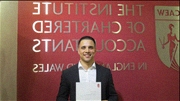Tutor HuntResources ACCA Resources
How To Pass P2 Corporate Reporting
This article explains why so many students fail P2 and offers advice on how students should prepare for the exam. Written by an exam prize winner and P2 tutor who has a 98% student pass rate, this is a must read for any student about to start preparing for the P2 exam.
Date : 04/08/2017
Author Information

Uploaded by : Kieran
Uploaded on : 04/08/2017
Subject : ACCA
Of the compulsory ACCA exams, P2 is the paper students find most challenging and pass rates reflect this by frequently being below 50%. There are several reasons for poor performance in P2, but the most overwhelming reason is that students do not know the P2 technical content is sufficient depth to be able to answer the challenging, yet very predictable, P2 exam questions.
I coach between 4-8 students for every P2 exam sitting and by developing their technical knowledge and exam technique skills, I have maintained a 100% student pass rate (i.e. all students who have attended all their scheduled classes and completed homework tasks have passed P2). As the vast majority of my students have failed P2 on a previous attempt with other tuition providers, I have been able to identify the skills they lacked during their previous attempts. A recurring weakness is that too many students do not have adequate F7 knowledge. F7 is a pre-requisite to P2 as both examine your financial reporting skills. The impact of a lack of F7 knowledge is twofold firstly, students will lose easy marks when material covered at F7 comes up in the P2 exam e.g. PPE and secondly, they lack the foundation knowledge on which to build the advanced P2 content. In order to circumvent this, I have included my recommended list of F7 pre-work at the bottom of the article. Even when students are completely up to speed with the assumed F7 knowledge, there is still a long way to go before they are at the standard required to pass this advanced exam. In terms of the P2 content, it is absolutely crucial that students are competent in application of group accounting concepts. A question on group accounting is guaranteed to be the compulsory question on the paper so inadequate preparation here is going to make it impossible to pass the exam. Students need to be comfortable in dealing with complex group scenarios when preparing consolidated financial statements (including the cash flow statement). Common exam scenarios include step-acquisitions / disposals, foreign subsidiaries, NCI movements, associates / joint ventures and goodwill adjustments. In addition, the examiner is also looking to test the other areas of the P2 syllabus which were not already examined at F7, notably share based payments, pensions and deferred tax. I ensure that my students have a deep understanding of all these topics so that they can react to whatever the examiner throws at them on exam day. Having a conceptual awareness of these advanced topics is far better preparation then the this is how to do it if it comes up proforma approach taught by large classroom tuition providers. Once students have deep conceptual understanding of the technical content, attention then needs to be paid to developing exam technique. P2 is a highly time pressured exam and ensuring that you don t run out of time will enable you to pick up marks across all 3 questions. I coach my students in an exam technique which allows them to answer each style of question as time efficiently as possible whilst still picking up full marks. This is the same technique which resulted in me scoring 88% in the ACA equivalent of P2 (the ICAEW awarded me a prize for this performance). In summary, the main 3 reasons why students P2 is due to a lack of brought forward F7 knowledge, inadequate understanding of the P2 content and inefficient exam technique. In order to combat this, your first port of call is to get up to speed with the F7 contentThis resource was uploaded by: Kieran
